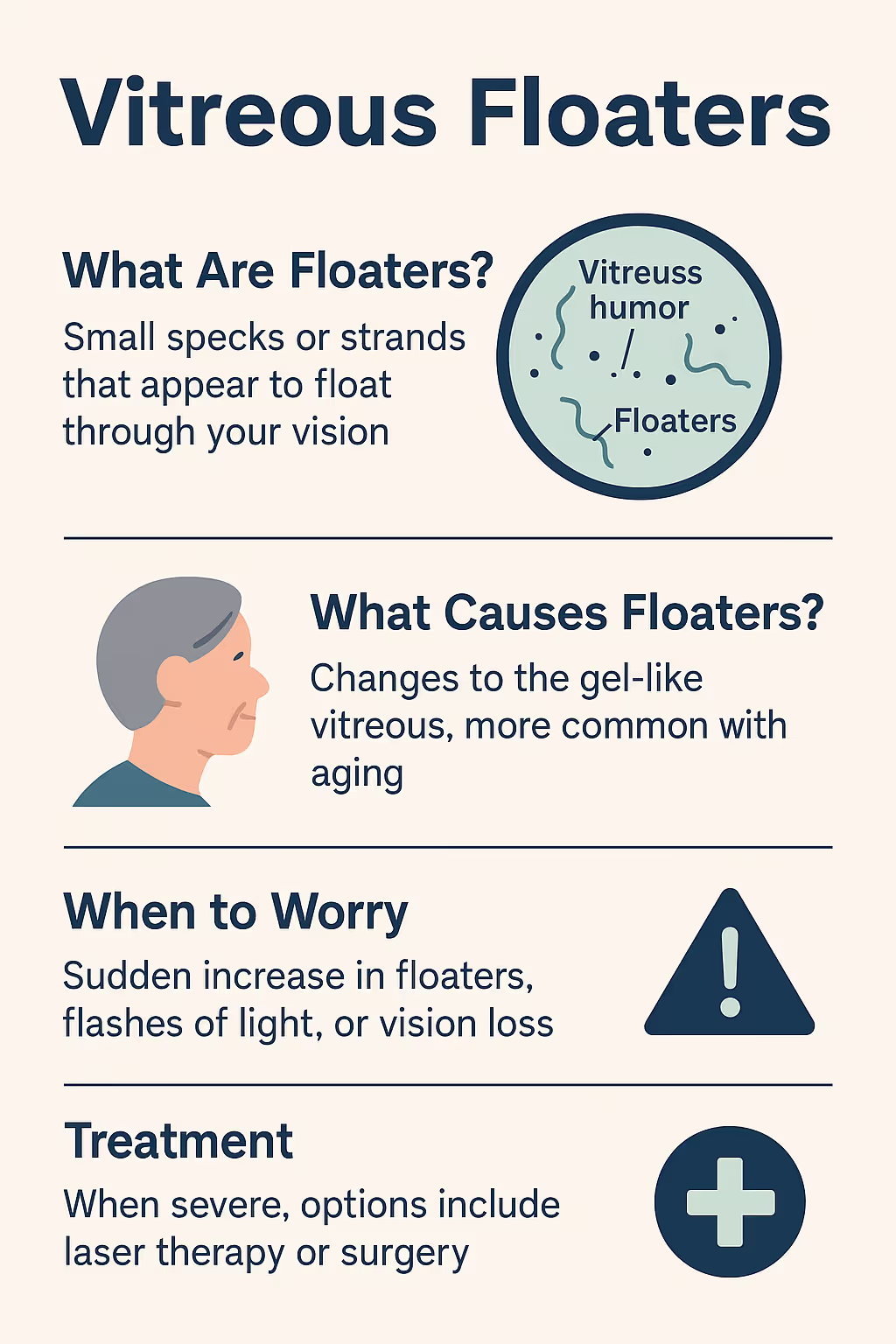What Are Vitreous Floaters? (And When Should You Worry?)
Have you ever noticed little squiggly lines, dots, or cobweb-like shapes drifting across your vision — especially when looking at a bright background like the sky or a white wall?
You're not imagining things. These are called vitreous floaters, and they’re a very common part of the aging process in the eye. At Vision Care Center in Bellevue, we see patients every week with questions about floaters — so here’s what you need to know.
🧠 What Exactly Are Floaters?
Inside your eye is a clear, gel-like substance called the vitreous humor. It’s made up of 99% water and 1% collagen (in fact, your entire eye is mostly collagen). As we age, the vitreous slowly begins to liquefy and shrink, pulling away from the retina — the light-sensitive tissue at the back of your eye.
At the same time, the collagen fibers begin to clump together. These dense clumps cast tiny shadows on your retina — and that’s what you see as floaters. It can look like many things, with most people describing them as “worms,” “bugs,” or even “cobwebs.” Your eye is like a snowglobe, when you move them around, all the stuff inside your eye moves too, including your floaters. That’s why when you try to look at it, it zips away.
📝 Fun fact from Dr. Jin in Bellevue: Floaters are especially common in nearsighted (myopic) individuals. Why? Because longer eye shapes increase the chance of the vitreous separating from the retina earlier in life.

📅 When Do Floaters Usually Start?
Floaters can show up at any age, but they’re more common in:
- People over 40
- Those who are nearsighted
- After eye surgeries (like cataract surgery)
- Following trauma to the eye
- Cases of uveitis (inflammation inside the eye)
🚨 When Floaters Might Be a Problem
Most floaters are harmless and just a little annoying. But sudden changes in floaters can signal something serious, like a retinal tear or detachment — a medical emergency that could lead to permanent vision loss.
👉 Call Vision Care Center immediately if you experience:
- A sudden increase in floaters
- Flashes of light in your peripheral vision
- A “curtain” or shadow moving across your vision
- Vision distortion or loss
👓 Can Floaters Be Treated?
In many cases, floaters fade or become less noticeable over time. Your brain either gets “used to it,” and ignores it completely, or gravity takes over and they sink to the bottom of your eyeball, below your line of sight. But for patients who are significantly bothered by them, there are treatment options available. However, surgical options are considered a “last resort,” and are only recommended if your floaters significantly reduce your quality of life.
- Laser vitreolysis: in this procedure, we use a laser to break your floaters into smaller pieces, with the idea that the floaters will be too small to notice. However, there is a chance that instead of seeing one large floater, you may see a bunch of tiny ones. The worst part: this procedure is typically NOT covered by insurance and will likely be an out of pocket expense.
- Vitrectomy – This is a very invasive surgery that requires the complete removal of all the vitreous in your eye, floaters included, and is replaced with a gas or an oil. This surgery can induce early cataracts, and the recovery period is intense.
- There are also pharmaceutical options available as well, however they can take 2-3 months before you even notice a difference.
At Vision Care Center, we can discuss all of your potential options if floaters are getting in the way of life.
🏥 Bottom Line
Floaters are a normal part of aging — but if they change suddenly or come with other symptoms, don’t ignore them.
At Vision Care Center in Bellevue, we’re here to help you protect your vision and catch early warning signs before they become serious.
📅 Book your eye exam today!
📞 Call us at (425) 746-2122 or schedule online!